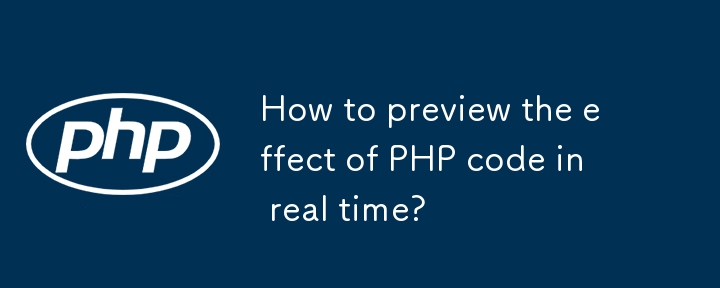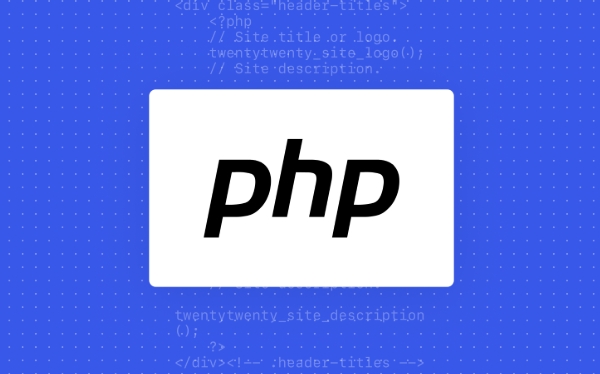To achieve real-time preview of PHP code effects, you need to build a local development environment and use it with the tools. 1. Use XAMPP, WAMP or MAMP to build a local server, place the PHP file in a specified directory and access it through localhost, and refresh the page after modification to view the results; 2. Use VS Code's Live Server plug-in or PHPStorm to save and automatically refresh the browser; 3. Use var_dump() or print_r() to debug output variable information in combination with browser developer tools to assist in troubleshooting problems. Although these methods are not completely real-time, they can quickly feedback the results and improve development efficiency.

If you want to see the effect in real time while writing PHP code, it can be a bit challenging. Because PHP is a server-side language, it is not as previewed directly in the browser like HTML or JavaScript. However, through some tools and settings, you can still achieve a close-to-"real-time preview" experience.

Build a local development environment
To run PHP code, you must first have a local server environment. The easiest way is to use integration packages like XAMPP, WAMP, or MAMP, which include Apache, MySQL, and PHP, and can quickly start the local server after installation.

- After the installation is complete, place your PHP file in
htdocs(XAMPP) or similar directory - Start the Apache service
- Visit
http://localhost/你的文件名.phpin your browser to see the execution results
In this way, after each modification and saving the code, you can refresh the page and see the latest effect. Although it is not completely "real-time", the response speed is very fast and can basically meet most needs.
Real-time refresh plug-in using a lightweight editor
Some editors can automatically refresh the browser after saving through plug-ins. for example:

- VS Code : With the "Live Server" plug-in, although it is mainly aimed at static files, it can also be used in PHP pages in combination with local servers.
- PHPStorm : More complete PHP support is built-in. After configuring the server, you can achieve the effect of saving and refreshing.
The core logic of this type of tool is to listen for file changes and then trigger the browser to reload, so that you don't have to press F5 manually.
Debugging output with browser developer tools
If you want to see variable values ??or intermediate results, rather than the entire page rendering effect, you can use var_dump() or print_r() to output information, and then view it in combination with browser developer tools.
Tips: In order to make the output clearer, you can add a sentence
echo '<pre class="brush:php;toolbar:false">';</pre>before it, so that the format will be easier to read.
Of course, this method is more suitable for debugging and cannot replace real previewing, but it is very practical when troubleshooting problems.
Basically these are the methods. Although PHP itself does not support direct preview like the front-end, as long as the local environment is well built and the right tools can also provide near-real-time feedback. The key is to choose a convenient editor and match the server. The rest is to save the code a few more times when writing it.
The above is the detailed content of How to preview the effect of PHP code in real time?. For more information, please follow other related articles on the PHP Chinese website!

Hot AI Tools

Undress AI Tool
Undress images for free

Undresser.AI Undress
AI-powered app for creating realistic nude photos

AI Clothes Remover
Online AI tool for removing clothes from photos.

Clothoff.io
AI clothes remover

Video Face Swap
Swap faces in any video effortlessly with our completely free AI face swap tool!

Hot Article

Hot Tools

Notepad++7.3.1
Easy-to-use and free code editor

SublimeText3 Chinese version
Chinese version, very easy to use

Zend Studio 13.0.1
Powerful PHP integrated development environment

Dreamweaver CS6
Visual web development tools

SublimeText3 Mac version
God-level code editing software (SublimeText3)

Hot Topics
 What are some best practices for versioning a PHP-based API?
Jun 14, 2025 am 12:27 AM
What are some best practices for versioning a PHP-based API?
Jun 14, 2025 am 12:27 AM
ToversionaPHP-basedAPIeffectively,useURL-basedversioningforclarityandeaseofrouting,separateversionedcodetoavoidconflicts,deprecateoldversionswithclearcommunication,andconsidercustomheadersonlywhennecessary.StartbyplacingtheversionintheURL(e.g.,/api/v
 How do I implement authentication and authorization in PHP?
Jun 20, 2025 am 01:03 AM
How do I implement authentication and authorization in PHP?
Jun 20, 2025 am 01:03 AM
TosecurelyhandleauthenticationandauthorizationinPHP,followthesesteps:1.Alwayshashpasswordswithpassword_hash()andverifyusingpassword_verify(),usepreparedstatementstopreventSQLinjection,andstoreuserdatain$_SESSIONafterlogin.2.Implementrole-basedaccessc
 What are weak references (WeakMap) in PHP, and when might they be useful?
Jun 14, 2025 am 12:25 AM
What are weak references (WeakMap) in PHP, and when might they be useful?
Jun 14, 2025 am 12:25 AM
PHPdoesnothaveabuilt-inWeakMapbutoffersWeakReferenceforsimilarfunctionality.1.WeakReferenceallowsholdingreferenceswithoutpreventinggarbagecollection.2.Itisusefulforcaching,eventlisteners,andmetadatawithoutaffectingobjectlifecycles.3.YoucansimulateaWe
 What are the differences between procedural and object-oriented programming paradigms in PHP?
Jun 14, 2025 am 12:25 AM
What are the differences between procedural and object-oriented programming paradigms in PHP?
Jun 14, 2025 am 12:25 AM
Proceduralandobject-orientedprogramming(OOP)inPHPdiffersignificantlyinstructure,reusability,anddatahandling.1.Proceduralprogrammingusesfunctionsorganizedsequentially,suitableforsmallscripts.2.OOPorganizescodeintoclassesandobjects,modelingreal-worlden
 How can you handle file uploads securely in PHP?
Jun 19, 2025 am 01:05 AM
How can you handle file uploads securely in PHP?
Jun 19, 2025 am 01:05 AM
To safely handle file uploads in PHP, the core is to verify file types, rename files, and restrict permissions. 1. Use finfo_file() to check the real MIME type, and only specific types such as image/jpeg are allowed; 2. Use uniqid() to generate random file names and store them in non-Web root directory; 3. Limit file size through php.ini and HTML forms, and set directory permissions to 0755; 4. Use ClamAV to scan malware to enhance security. These steps effectively prevent security vulnerabilities and ensure that the file upload process is safe and reliable.
 What are the differences between == (loose comparison) and === (strict comparison) in PHP?
Jun 19, 2025 am 01:07 AM
What are the differences between == (loose comparison) and === (strict comparison) in PHP?
Jun 19, 2025 am 01:07 AM
In PHP, the main difference between == and == is the strictness of type checking. ==Type conversion will be performed before comparison, for example, 5=="5" returns true, and ===Request that the value and type are the same before true will be returned, for example, 5==="5" returns false. In usage scenarios, === is more secure and should be used first, and == is only used when type conversion is required.
 How can you interact with NoSQL databases (e.g., MongoDB, Redis) from PHP?
Jun 19, 2025 am 01:07 AM
How can you interact with NoSQL databases (e.g., MongoDB, Redis) from PHP?
Jun 19, 2025 am 01:07 AM
Yes, PHP can interact with NoSQL databases like MongoDB and Redis through specific extensions or libraries. First, use the MongoDBPHP driver (installed through PECL or Composer) to create client instances and operate databases and collections, supporting insertion, query, aggregation and other operations; second, use the Predis library or phpredis extension to connect to Redis, perform key-value settings and acquisitions, and recommend phpredis for high-performance scenarios, while Predis is convenient for rapid deployment; both are suitable for production environments and are well-documented.
 How do I perform arithmetic operations in PHP ( , -, *, /, %)?
Jun 19, 2025 pm 05:13 PM
How do I perform arithmetic operations in PHP ( , -, *, /, %)?
Jun 19, 2025 pm 05:13 PM
The methods of using basic mathematical operations in PHP are as follows: 1. Addition signs support integers and floating-point numbers, and can also be used for variables. String numbers will be automatically converted but not recommended to dependencies; 2. Subtraction signs use - signs, variables are the same, and type conversion is also applicable; 3. Multiplication signs use * signs, which are suitable for numbers and similar strings; 4. Division uses / signs, which need to avoid dividing by zero, and note that the result may be floating-point numbers; 5. Taking the modulus signs can be used to judge odd and even numbers, and when processing negative numbers, the remainder signs are consistent with the dividend. The key to using these operators correctly is to ensure that the data types are clear and the boundary situation is handled well.






